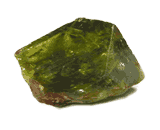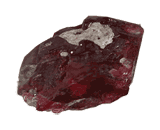| Gemstone Chart |
 Natural Sphene Natural Sphene
Sphene is also known as calcium titanium silicate.It is named from the greek word for wedge, because of its typical wedge shaped crystal habit.Because of it's high dispersion and refractive index, a well cut sphene can display stunning brilliance. Sphene is somewhat soft and as a result is more suitable as a pendant than as a ring stone. Sphene is rarely very clean.
Color: Green, yellow. brown
Categories: semi-precious stone
Chemical Composition: CaTiSiO5
Crystal Group: Monoclinic
Refractive Index: (1.885-1.990,)-(1.915-2.050)
Hardness: 5.5
Density: 3.52-3.54
Occurrence: Austria, Dheirene-Madagascar, India, USA, Brazil.
|  Natural Spinel Natural Spinel
Spinel is the magnesium aluminium member of the larger spinel group of minerals. It has the formula MgAl2O4.Pure spinel is white, but impurities give it a wide range of colors.Almost all colors are used in jewelry, but the most valuable and popular color is the deep red. Spinel is cut into gems for use as jewelry. The deep-red variety, known as ruby spinel, is the most prized form.
Color: orange, pink, black, blue, lavender, mauve, greenish blue, and vivid red
Categories: semi-precious stone
Chemical Composition: MgAl2O4
Crystal Group: Cubic
Refractive Index: 1.718 (-.006,+.044)
Hardness: 8
Density: 3.60 (-.03, +.30)
Occurrence: Mogok, Burma; Sri Lanka; Amboseli district, Kenya; Jemaa district, Nigeria; Matombo, Umba, and Tunduru Tanzania; Hunza, Pakistan; Pamir range, Tajikstan; Luc Yen, Vietnam; Madagascar; Australia; Sweden; Brazil.
|  Natural Topaz Natural Topaz
Topaz is a silicate mineral most often found in igneous rocks of felsic composition. It is a common gemstone that has been used for centuries in jewelry. Gem quality topaz most commonly occurs in nature as a colorless crystal. It is a very popular gemstone.
Color: colorless, blue, yellow-brown, pinkish orange, red-orange, red-brown, tan.
Categories: semi-precious stone
Chemical Composition: AL(F,OH)2SIO4
Crystal Group: Orthorhombic
Refractive Index: 1.629 - 1.637
Hardness: 8
Density: 3.52 - 3.56
Occurrence: Brazil, Sri Lanka, Nigeria, Germany, Australia, Japan, Russia, Ireland, Zimbabwe.
|  Natural Turquoise Natural Turquoise
Turquoise is an opaque, blue-to-green mineral that is a hydrous phosphate of copper and aluminium.The gem turquoise owes it's beauty almost entirely to its superb color. It has been used for ornamentation since 3000BC and possibly before.
Color: Blue, Greenish Blue
Categories: semi-precious stone
Chemical Composition: CuAl6(PO4)4(OH)85H2O
Crystal Group: Triclinic
Refractive Index: 1.62
Hardness: 5.5-6
Density: 2.60- 2.90
Occurrence: Iran, USA, India, Tibet, China, Egypt, Chile, Russia, Australia
|  Natural Zircon Natural Zircon
Zircon is a mineral belonging to the group of nesosilicates. It is one of the heaviest gemstones, which means that it will look smaller than other varieties of the same weight. Zircon occurs in a wide range of colours,the most popular colour is blue zircon. The wide variety of colours of zircon, its rarity, and its relatively low cost make it a popular collector's stone.
Color: Brown, blue, red, orange, white, green
Categories: semi-precious stone
Chemical Composition: ZrSiO4
Crystal Group: Tetragonal
Refractive Index: 1.780-1.984
Hardness: 7.5
Density: 4.00-4.73
Occurrence: Ceylon, Burma,France, Norway, East Africa,Australia, SE Asia.
|
|
